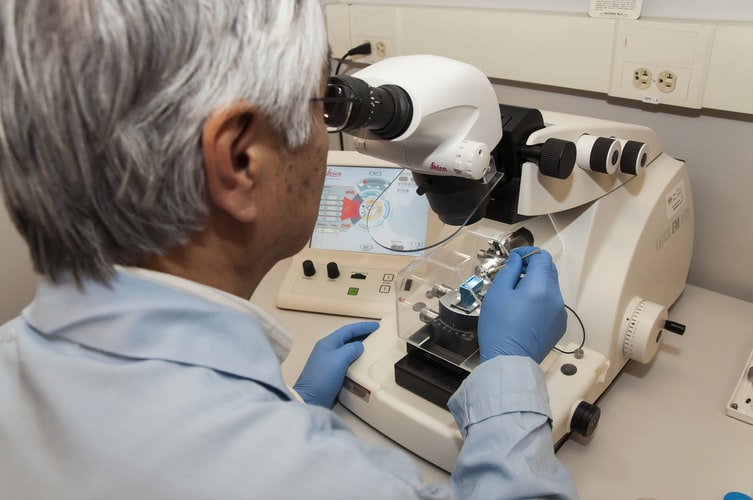Mesothelioma is a rare and incurable cancer that has been linked to asbestos. If you were diagnosed with mesothelioma, we can help you understand your treatment options, find an experienced mesothelioma doctor, and navigate the financial resources that you may be eligible for.
Mesothelioma is a type of cancer caused by asbestos. When asbestos fibers are inhaled, they may embed within the linings of the lungs, heart, or abdomen where they can cause malignant tumors to form decades later.
The most common mesothelioma symptoms are chest pain and shortness of breath. Treatment options such as surgery, radiation, and chemotherapy may improve a patient’s prognosis, but the average life expectancy for someone with this aggressive cancer is around 12 months.

What Is Mesothelioma?
Mesothelioma is a rare and incurable form of cancer caused by asbestos. Most patients have pleural mesothelioma which affects the lungs, but the cancer can also develop in the heart, testes, and abdomen.
Key Facts About Mesothelioma
- Each year, more than 3,000 Americans are diagnosed with mesothelioma
- Men are more likely to develop mesothelioma than women
- The average age of mesothelioma patients is 69 years old
- Three out every four mesothelioma cases are pleural mesothelioma, which affects the lungs
- Typically, the life expectancy for mesothelioma is 12 to 21 months
Symptoms of Mesothelioma
Patients typically begin feeling symptoms after tumors grow and press against the abdominal cavity or chest wall. Most often, patients report shortness of breath and chest pain as their initial symptoms.
Common Symptoms:
-
Fatigue
-
Dry cough
-
Muscle weakness
-
Shortness of breath
-
Fever or night sweats
-
Respiratory complications
-
Pain in the abdomen or chest
-
Pleural effusion (fluid around the lungs)
How to Diagnose Mesothelioma
While there are a number of diagnostic procedures a doctor may use, the only way to confirm that a patient has mesothelioma is by performing a biopsy of the cells in question. Early diagnosis of mesothelioma may broaden a patient’s treatment options.

Imaging Scans
Most patients discover they have mesothelioma after doctors see abnormalities in their chest x-ray. If doctors notice fluid around the lungs or abnormal growths, they may recommend the patient undergoes more in-depth imaging scans. These can include MRIs, PET scans, or CT scans.

Biopsies
When abnormal growths are found and cancer is suspected, doctors will likely take a tissue sample to confirm or deny whether the cells are malignant mesothelioma cells.

Blood Tests
Your doctor may order blood work, but a simple blood test is unable to confirm whether or not mesothelioma is present.

Staging
While there are at least five different systems that can help stage pleural mesothelioma, the preferred system is the IMIG system. Staging helps medical professionals understand the severity of your mesothelioma and how much it has spread throughout your body.

What Causes Mesothelioma?
The predominant cause of mesothelioma is asbestos exposure.
Those that came in contact with the mineral in its natural form or in asbestos-containing products commonly used by the military, construction, insulation, and automotive industries have an increased risk of developing cancer.
Mesothelioma Development
The typical progression from initial asbestos exposure to the development of mesothelioma looks like the following:
1. Someone swallows or inhales airborne microscopic asbestos fibers.
2. The fibers attach to the lining of the heart, abdomen, or lungs.
3. Mesothelial cells are damaged and become inflamed.
4. Tumors develop over time on the damaged mesothelium, eventually leading to mesothelioma.
Who is most at risk of developing mesothelioma?
Individuals who have been repeatedly exposed to asbestos over a long period of time, most likely in their careers, are more likely to develop mesothelioma.
Secondhand asbestos exposure can also increase an individual’s risk for developing mesothelioma. This happens when the children, spouses, or roommates of the person who works with asbestos inhale asbestos fibers that have clung to work clothing and equipment.
VETERANS
While veterans of all branches of the U.S. military may have been exposed to asbestos at one point in their service, those that served in the U.S. Navy are particularly at risk of developing mesothelioma. This is because naval aircraft carriers and other ships commonly used asbestos as insulation.

BLUE-COLLAR WORKERS
Shipyard workers, power plant workers, mechanics, and construction workers are more likely to be exposed to asbestos compared to other professions.

FAMILY MEMBERS AND ROOMMATES OF ASBESTOS WORKERS
Those that live with someone who is regularly exposed to asbestos at work may have an increased risk of developing mesothelioma themselves. Handling asbestos-contaminated work clothing can cause secondhand asbestos exposure.

What Are the Stages of Mesothelioma?
Mesothelioma presents itself in four stages, each of which is based on the size and location of the tumors. Early on, mesothelioma tumors are typically confined to one area of the body, commonly the abdominal, heart, or chest cavity. As the cancer progresses, tumors spread to other parts of the body, making it more difficult to cure. The stage of mesothelioma is important when determining a treatment plan.
-
Stage 1
In its earliest stage, mesothelioma is still localized. At this point, the survival rate is higher and surgery can be more effective. The median life expectancy at stage 1 is 22.2 months.
-
Stage 2
Tumors have now spread beyond the original location and have started growing in adjacent areas of the body. At stage 2, surgery may still be effective. The median life expectancy for patients with stage 2 mesothelioma is 20 months.
-
Stage 3
Once mesothelioma reaches stage 3, tumors have likely grown on nearby lymph nodes. Surgery may still help, but only in certain situations. The median life expectancy at stage 3 is 17.9 months.
-
Stage 4
By the time mesothelioma has developed into stage 4, tumors have grown on organs all throughout the body. Immunotherapy and chemotherapy may be able to ease symptoms. The median life expectancy is 14.9 months.
Pleural
The most common type of mesothelioma, accounting for 75% of all cases.
Pleural mesothelioma forms on the soft tissue that covers the lungs: the pleura.
The best treatment is often a combination of therapies, including surgery, chemotherapy, or radiation.
Peritoneal
Less common than pleural mesothelioma, accounting for a little less than 20% of all cases.
Peritoneal mesothelioma develops on the lining of the abdomen: the peritoneum.
The best treatment is a combination of heated chemotherapy and surgery.
Pericardial
Very rare, making up just 1% of all mesothelioma cases.
Tumors develop on the soft tissue surrounding the heart: the pericardium.
The best treatment is a combination of therapy types.
Testicular
The rarest form of mesothelioma, accounting for less than 1% of cases.
Tumors grow in the lining of the testes.
The most effective treatment is typically surgery.
Learn About the Types of Mesothelioma
Mesothelioma Cell Types
There are three types of mesothelioma cells, each named for a cancerous tumor cell. The three types are epithelioid, sarcomatoid, and biphasic. While some of them are fairly common and respond well to certain treatments, there are others that are rarer and can be quite resistant to therapies.
-
Epithelioid
Accounting for 70% of mesothelioma diagnoses, epithelioid cells are the most responsive to treatment. Because this type of mesothelioma cell is more easily treated, patients may have a longer life expectancy.
-
Sarcomatoid
Sarcomatoid cells are more rare and are the least responsive to treatment. Because they respond poorly to treatment, patients with sarcomatoid cells often have a poorer prognosis and shorter life expectancy.
-
Biphasic
A combination of both sarcomatoid and epithelioid cells, the life expectancy and prognosis for a patient with biphasic mesothelioma cells varies depending on the ratio of cell types at any given time. Biphasic cells account for 30-40% of mesothelioma cases.
Treatment Options for Mesothelioma
There are several ways that mesothelioma can be treated. In most cases, conventional methods such as radiation, chemotherapy, and surgery are adequate, but not all patients are eligible for each of these treatments. Many patients also take alternative treatment routes, such as clinical trials, emerging cancer treatments, and various alternative therapies.

Surgery
If mesothelioma is caught early enough, surgery may offer patients the greatest chance for survival as it can greatly limit cancer growth and spread. Surgery is typically performed to diagnose and remove tumors, but it can also help relieve pain and symptoms.

Chemotherapy
The most common form of treatment, more than 70% of patients with mesothelioma undergo chemotherapy. While chemotherapy is an effective way to kill cancer cells and minimize tumors, patients may experience uncomfortable side effects, such as fatigue, nausea, and loss of appetite.

Radiation
Often combined with chemotherapy and surgery, radiation can be used to treat mesothelioma at any stage. Radiation is an effective way to slow tumor growth and reduce pain.

Clinical Trials
If patients have not had luck with traditional forms of mesothelioma treatment, they may choose a form of treatment that is still in the experimental phase. Clinical trials are offered to mesothelioma patients throughout the country and can help lead to new and better treatments in the future.

Finding the Best Mesothelioma Treatment
Because of how rare mesothelioma is, many doctors do not have experience treating it. There are specialty mesothelioma treatment centers that offer patients access to the latest treatments and research so they can have the best chance of survival.

Mesothelioma Doctors
When you have a rare disease, it’s important to find a specialist that is experienced in the disease you have. There are mesothelioma specialists that have experience in every aspect of mesothelioma care, including radiology, pathology, surgery, palliative care, and radiation oncology. Working with a doctor or team of doctors that specialize in mesothelioma can significantly improve your overall level of care.

Mesothelioma Treatment Centers
In addition to having a team of top doctors on your side, going to a treatment center that specializes in mesothelioma ensures you have access to the latest mesothelioma treatments. You will often find the top mesothelioma medical experts at these treatment centers who research potential cures and new treatments.

Mesothelioma Prognosis
In most cases, patients who are diagnosed with mesothelioma have a life expectancy of 12 months or less. Prognosis can improve if mesothelioma is detected early and if the patient receives a combination of treatment methods. Forty percent of patients diagnosed with mesothelioma survive a year or more beyond diagnosis.
Key Factors
The main factors that affect a mesothelioma patient’s prognosis are the stage and cell type of their cancer. Peritoneal mesothelioma, for example, has a higher survival rate. Other factors that can impact prognosis include gender, age, and asbestos exposure history. While women and younger patients typically have a better prognosis than older men, at this time mesothelioma is still incurable for all patients.
Can You Improve Your Prognosis?
There is no guarantee that your prognosis can improve, but maintaining a healthy lifestyle may help reduce symptoms and improve overall health. Eating a nutrient-rich diet, maintaining a regular sleep schedule, refraining from smoking, and following medical orders and advice can help throughout your treatment.
Financial and Legal Options for Mesothelioma Patients
Mesothelioma is a preventable form of cancer, caused by exposure to asbestos. If a company or organization exposed you or a loved one to asbestos unnecessarily, you may be able to pursue financial and legal assistance. Medical costs, lost wages, and other related expenses can take a huge toll on a family navigating the stress and uncertainty of a mesothelioma diagnosis. An experienced mesothelioma lawyer can review your case and help you determine what course of action makes the most sense for your family.

Lawsuits
A patient with mesothelioma may be eligible to file a personal injury lawsuit against the company potentially responsible for their exposure to asbestos. If the patient has already passed away, the patient’s estate can file a wrongful death lawsuit.
Lawsuits are commonly filed on the behalf of individuals who were exposed to asbestos at work, even well after asbestos use was heavily regulated. Individuals who work in construction, demolition, or renovation of older homes and buildings may have an increased risk of asbestos exposure due to the mineral’s prevalence in insulation and other materials.

Trust Funds
Many companies involved in asbestos mining, manufacturing, installation, and more have established trust funds to help provide compensation for people exposed to asbestos. In most cases, this exposure was due to a company’s negligence, and the patient is able to seek compensation to cover their medical costs. Nearly all of these companies have filed for bankruptcy, but the funds are still available to those who are eligible. An attorney experienced in mesothelioma claims can help identify which trust funds you are eligible for, and help you file a claim.

VA Claims
The U.S. Navy relied heavily on asbestos for aircraft carrier insulation and other shipbuilding needs. Because of this, veterans who have since been diagnosed with mesothelioma may be able to claim VA benefits to cover both financial and medical needs.

Asbestos and Mesothelioma Lawyers
Mesothelioma.app



 Rae Steinbach
Rae Steinbach